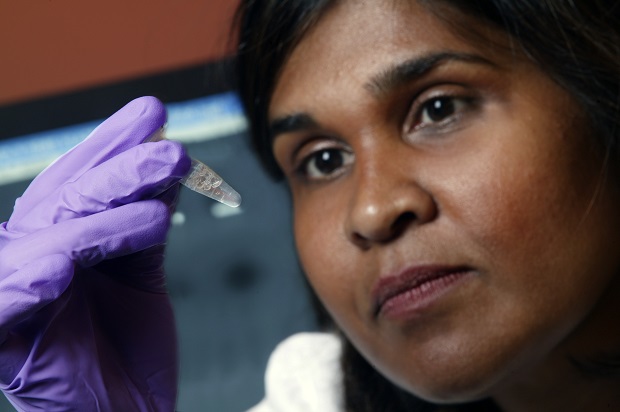Baby thought cleared of HIV has virus again

In this undated file image provided by Johns Hopkins Medicine in 2005 Dr. Deborah Persaud, a pediatric HIV expert at Johns Hopkins’ Children’s Center in Baltimore, holds a vial. On Thursday, July 10, 2014, doctors and officials at the National Institutes of Health said new tests last week showed that a Mississippi girl born with the AIDS virus is no longer in remission. The girl is now back on treatment and is responding well, doctors said. AP FILE PHOTO/Johns Hopkins Medicine
WASHINGTON – A girl who was born HIV-positive but was treated early and showed no signs of the disease for years has seen her infection return, US doctors said Thursday.
The girl’s story had raised hopes that doctors may have found a way to cure young children who are born HIV-positive, simply by giving them strong anti-retroviral drugs shortly after birth.
“Certainly, this is a disappointing turn of events for this young child, the medical staff involved in the child’s care and the HIV/AIDS research community,” said Anthony Fauci, director of the National Institute of Allergy and Infectious Diseases.
Known widely as the “Mississippi baby,” she was born to an HIV-positive mother in 2010 and was given a potent dose of anti-retroviral medication 30 hours after birth.
She continued taking the medications until the age of 18 months, when doctors lost track of her. When she returned five months later, doctors could find no sign of the virus, even though she had not been taking her daily pills.
Article continues after this advertisementThe child continued to stay off treatment and showed no sign of the virus for more than two years.
Article continues after this advertisement“Typically, when treatment is stopped, HIV levels rebound within weeks, not years,” said Deborah Persaud, professor of infectious diseases at the John Hopkins Children’s Center in Baltimore.
Persaud described the child’s response as “unprecedented.”
Now age four, she was tested during a routine clinical care visit earlier this month, and was found to have detectable HIV levels in her blood.
She also had a decreased T-cell count and the presence of HIV antibodies, signaling that her body was fighting the infection and that HIV was actively replicating again in her body.
The girl, whose identity has not been released, is now being treated once again with anti-retroviral medication and is doing well, Fauci said.
“The case of the Mississippi child indicates that early anti-retroviral treatment in this HIV-infected infant did not completely eliminate the reservoir of HIV-infected cells that was established upon infection but may have considerably limited its development and averted the need for anti-retroviral medication over a considerable period,” said Fauci.
Researchers must now turn their attention to understanding why and how the child went into remission, with the hope of extending that time period even further in future cases, he said.
The Mississippi baby’s case was detailed in the New England Journal of Medicine in 2013.
Earlier this year, researchers reported a second case of an infant, this time in California, who was treated within hours of birth and whose HIV remained undetectable nearly a year later.
However, that child was still taking anti-retroviral drugs, and doctors said they would not consider taking her off them until she reached the age of two.
RELATED STORIES
HIV cured in baby for the first time – scientists
Fil-Am scientist, who helped find a cure for HIV baby, among TIME’s most influential people